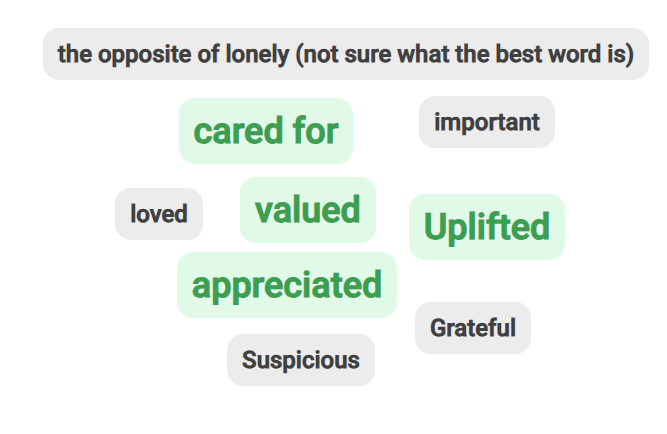On 19 June 2025 IP Inclusive and Jonathan’s Voice held a joint webinar, The Power of Kindness in an Unkind World, to explore some of the evidence that being kind is actually good for your mental and physical health. Our speakers, Penny Aspinall and Barbara Lawton, also thought about what gets in the way of being kind, some suggestions for how we can introduce kindness in the workplace, and the value of self-compassion.
The benefits of kindness
There is a lot of evidence that showing kindness to others and ourselves is actually beneficial, both to our mental and physical health. The act of being kind makes us feel good about ourselves, and can even lower our blood pressure. A quick Slido poll during the webinar asked “How does receiving kindness make us feel?” and the results are shown below.

The reverse is also true: another poll asked the audience “How did you feel when you could have been kind and weren’t?” and the results were overwhelmingly negative.

Many things can stop us from being kind when we could have: time; assuming someone else will help; not wanting to interfere; being preoccupied; or even revenge. However, by taking time to notice what stops you, and being aware of the benefits of being kind, you could open up more opportunities to make yourself and others feel better.
Compassion in leadership
A new approach to leadership using compassion is now being seen as more effective than traditional approaches. Compassion at the core of leadership addresses dual aims of performance and wellbeing; people will perform better if they feel better. Conversely, if people are worried about being berated for making mistakes, it could inhibit their natural ability.
The power of kindness in the workplace
There is a growing recognition that kindness rather than a competitive bullying culture leads to stronger performance at work. A kind and supportive workplace encourages empathy and trust and can lead to better decision making, more creativity and flexibility. It may also lead to greater staff loyalty and engagement and even increased productivity. There are free resources on www.www.grahamallcott.com to equip individuals and companies to transform work for the better.
Kindness starts with you
We often speak to ourselves in a way we would never treat others, but self-compassion is an important part of making ourselves feel better and role modelling kind behaviour in the workplace. Try to change the critical and negative language you use when talking to yourself into something more gentle and accepting. Of course we are all human and will make mistakes, but it is important to view them as learning opportunities. There are some useful ideas for self compassion on www.self-compasion.org.
What’s the difference between niceness and kindness
Nice is telling people what they want to hear, whereas kindness is telling the truth in a constructive way that will be useful. When someone has made a mistake, being empathetic is important. Be thoughtful about the words and tone you use, and think about your body language.
Accidental unkindness
As mentioned earlier, unkindness is often the product of busyness. We are all often busy, rushing and under the pressure of deadlines, and it can seem that taking a moment for someone else will get in the way of what we need to do. The product of urgent culture is people feeling stressed and anxious and it causes us to act unkindly, such as ill-considered replies to emails or texts, or messages sent to the wrong person. If we slow down, take a break, reflect and reset before we rush into acting, or take the time to notice how our colleagues are doing around us, it can lead to a more productive workplace and team overall.
Develop good listening skills
Part of compassionate leadership and kindness in the workplace is careful listening. Good listening is hard; our clever brains often get the gist of what someone is saying much quicker than they can say it, which leaves time for us to zone out, get distracted, and not pay full attention. This in turn leads to the person speaking feeling undervalued. Instead take the time to pay conscious attention, notice their body language, or changes in their normal behaviour. For further tips on having difficult conversations with colleagues, see our previous webinar Taking the conversation one step further.
Creating a kindness culture in your workplace
There are lots of ways you can start to create a kindness culture in your workplace. Start by being a good role model – looking after yourself, and treating other people kindly. Focus on the part of the organisation immediately around you, and think about any strategies or routines you could introduce such as a shared lunch once a month or Thank You Thursdays.